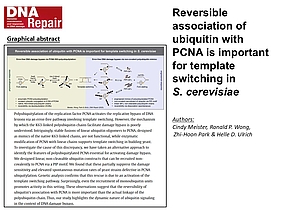New publication by the Ulrich lab on why reversible association of ubiquitin with PCNA is important for template switching in S. cerevisiae
Meister C, Wong RP, Park ZH, Ulrich HD (2025) Reversible association of ubiquitin with PCNA is important for template switching in S. cerevisiae.DNA Repair (Amst), doi: 10.1016/j.dnarep.2025.103842 Link
Abstract:
Polyubiquitylation of the replication factor PCNA activates the replicative bypass of DNA lesions via an error-free pathway involving template switching. However, the mechanism by which the K63-linked polyubiquitin chains facilitate damage bypass is poorly understood. Intriguingly, stable fusions of linear ubiquitin oligomers to PCNA, designed as mimics of the native K63-linked chains, are not functional, while enzymatic modification of PCNA with linear chains supports template switching in budding yeast. To investigate the cause of this discrepancy, we have taken an alternative approach to identify the features of polyubiquitylated PCNA essential for activating damage bypass. We designed linear, non-cleavable ubiquitin constructs that can be recruited non-covalently to PCNA via a PIP motif. We found that these partially suppress the damage sensitivity and elevated spontaneous mutation rates of yeast strains defective in PCNA ubiquitylation. Genetic analysis confirms that this rescue is due to an activation of the template switching pathway. Surprisingly, even the recruitment of monoubiquitin units promotes activity in this setting. These observations suggest that the reversibility of ubiquitin’s association with PCNA is more important than the actual linkage of the polyubiquitin chain. Thus, our study highlights the dynamic nature of ubiquitin signaling in the context of DNA damage bypass.
Read the full paper here: https://www.sciencedirect.com/science/article/pii/S1568786425000382?via%3Dihub

